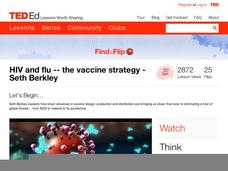Curated Video
Pandemic Viruses
Pandemic viruses can spread around the world. Viruses invade our bodies destroying cells and infecting others, but how do they do it? Biology - Cells And DNA - Learning Points. Viruses are deadly, contagious and can spread easily around...
PBS
HIV/AIDS: What Can We Learn From America's Last Epidemic?
America's last major epidemic was the HIV/AIDS crisis of 1980s and 1990s. In order to better understand our current circumstances, Danielle is looking back at the legacies of action and inaction surrounding HIV/AIDS and how the...
SWPictures
The Deadly Combination: The New Spread of TB in South Africa
The Deadly Combination part 1/5: The video is about the impact of tuberculosis in South Africa, focusing on the story of a family affected by the disease. It highlights the challenges of diagnosis, treatment, and prevention, while also...
SWPictures
The Deadly Combination: Getting Treated for TB in South Africa
The Deadly Combination part 3/5: The video discusses the challenges of treating tuberculosis, including patient compliance and the rise of drug-resistant strains. It also explores the controversial practice of isolating patients with...
SWPictures
The Deadly Combination: Living with Drug-Resistant Tuberculosis
The Deadly Combination part 5/5: The video is about the challenges faced by patients with drug-resistant tuberculosis in South Africa, including the toxic side effects of treatment and the long wait times for test results. It highlights...
SWPictures
The Deadly Combination: The New TB Epidemic
The Deadly Combination part 4/5: This video highlights the emergence of XDR TB in South Africa and the challenges faced by healthcare workers in treating patients with drug-resistant strains. It also showcases the controversial approach...
Global Health with Greg Martin
HIV - an exceptional epidemic? An interview with Prof Alan Whiteside
Is the HIV / AIDS epidemic exceptional? Should the global health response be differentiated from mainstream health interventions? Dr Greg Martin interview Prof Alan Whiteside who talks about a paper that he published in Globalization and...
SWPictures
The Deadly Combination: How HIV is Fueling the TB Epidemic in South Africa
The Deadly Combination part 2/5: This video highlights the impact of drug-resistant TB in South Africa, where the disease is particularly dangerous for those with weakened immune systems due to HIV. It follows the story of a family...
Bozeman Science
Population Variation
Tasmanian devils are scavengers who eat dead animals including the bones and fur. A video begins with cancer in Tasmanian devils to demonstrate the importance of genetic variation. Then examples such as the black-footed ferret and AIDS...
Bozeman Science
Viral Replication
Explain how viruses use the lytic and lysogenic cycles with an explanatory video. The resource also describes retroviruses and the virulence of bacteria.
Emergent Order
The Economics of Dallas Buyers Club
How do entrepreneurship and crony capitalism intersect with federal regulation and the Food and Drug Administration in Dallas Buyers Club? This is a fascinating video that covers a wealth of economic concepts while referencing the recent...
TED-Ed
How Close Are We to Eradicating HIV?
What is being done to halt the spread of HIV/AIDS? An intriguing short video details current treatments available, including the use of antiretrovirals, to stop the transmission of the devastating disease.
Geography Now
Geography Now! Eswatini
It's know as Swaziland no more—welcome, Estwatini! The African nation, while home to stunning geographical diversity, is one of the continent's smallest. It also has its challenges, with roughly a quarter of the adult population infected...
Howard Hughes Medical Institute
HIV Life Cycle
Almost half of the global population infected with HIV cannot afford treatment. To better understand this devastating disease, young scientists observe the life cycle of HIV. Through animation, they see the cell infection,...
Howard Hughes Medical Institute
Protease Inhibitors
Protease inhibitors currently treat HIV and hepatitis C, but in the future, might also be used to treat some cancers. Viewers learn how HIV spreads in the body and then observe what happens after the introduction of a protease...
Howard Hughes Medical Institute
U.S. AIDS Epidemic
The first AIDS cases in the United States were reported in June of 1981. AIDS quickly became an epidemic soon and the lack of a treatment or cure caused fear in the entire population. Viewers observe a geographical representation of the...
Howard Hughes Medical Institute
AZT Blocks Reverse Transcriptase
AZT, developed in the 1960s to treat cancer, actually treats HIV as well. Viewers observe how AZT blocks the reverse transcriptase of HIV. Then they see what happens when the virus mutates to be immune to AZT.
Stated Clearly
Does the Theory of Evolution Really Matter?
Without the theory of evolution, we wouldn't understand the origins of HIV. The video explains three mysteries solved using the theory of evolution. It opens with shrinking fish, then the origins of HIV, and finally why grasslands turn...
Amoeba Sisters
Viruses: Virus Replication and the Mysterious Common Cold
Viruses were nano before it was cool. The video discusses viruses such as the common cold and HIV. It includes the structure of a virus and the two cycles: the lytic cycle and the lysogenic cycle.
TED-Ed
Why it's so Hard to Cure HIV/AIDS
Believe it or not, a man was cured of HIV in 2008; unfortunately doctors are still scratching their heads trying to figure out how it happened. Follow along with this short video to learn about this deadly virus and the unique...
TED-Ed
Don't Misrepresent Africa
"We can sharpen our insights. It is not always war, insurrection, and disease." Leslie Dodson enlightens us to the impact that photographs have on our perception of a situation, and urges her audience to review our "ethics of...
Curated OER
HIV Virus
The parts of HIV are pointed out while the steps of the virus to overtake a cell are listed. Highly scientific terms make this resource appropriate for an advanced placement or college level biology course.
TED-Ed
HIV and Flu -- The Vaccine Strategy
What is the biggest threat to a mass number of humans? Not natural disasters, but rather, pandemics! With a lecture and slide show, the speaker discusses how medical technology in the form of vaccines is bringing an end to suffering and...
Curated OER
Virus Crisis
New diseases have recently been introduced to the human race that once only existed in animals. Follow the initiation of the West Nile virus to the United States and the complications it has caused.
















